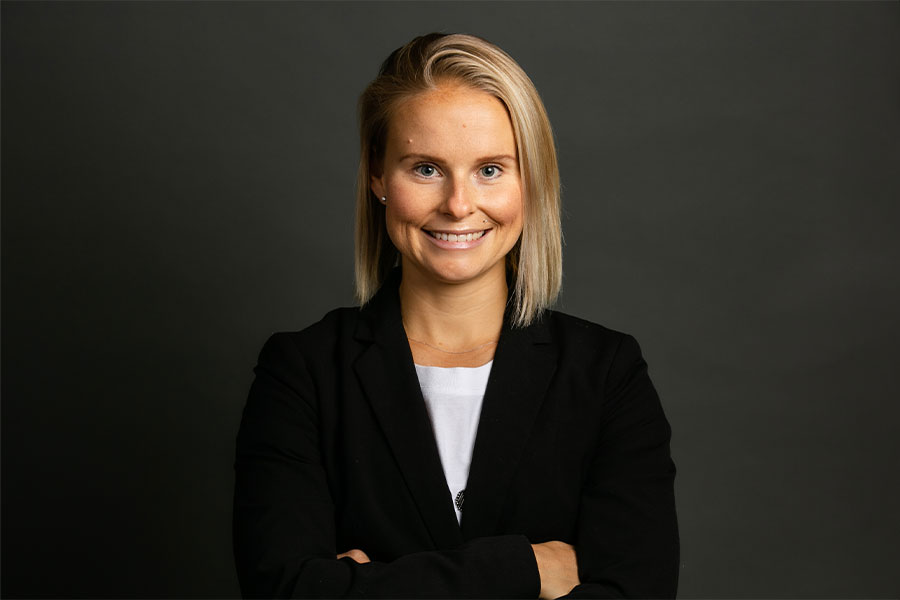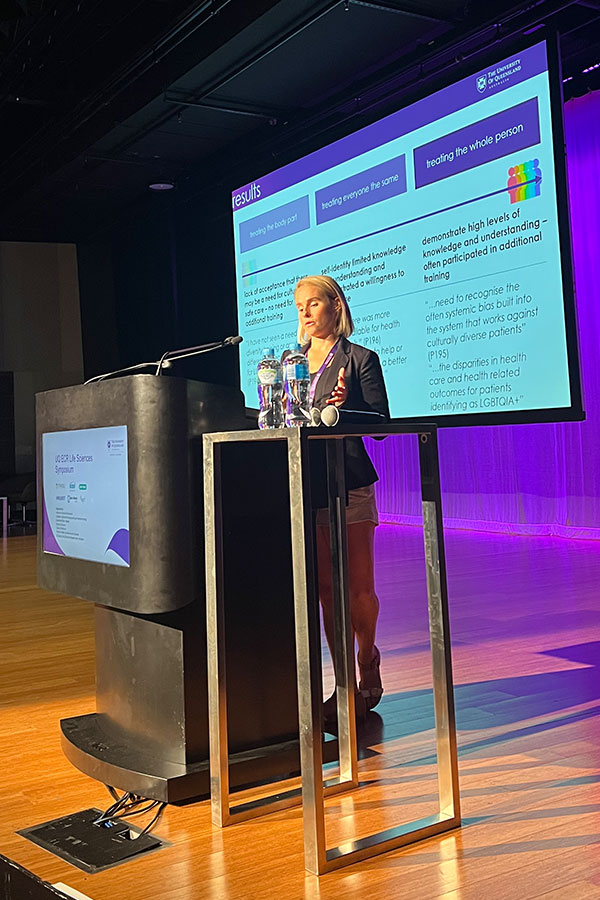UQ Postdoctoral Research Fellow and physiotherapist Dr Megan Ross (Bachelor of Physiotherapy (Honours) ’12, Doctor of Philosophy ’20) was recently appointed as inaugural Chair of the LGBTQIA+ Advisory Committee for the Australian Physiotherapy Association (APA), which aims to increase awareness and inclusivity within the physiotherapy profession for both patients and clinicians. Dr Ross’s appointment follows her extensive research into this area. The UQ Ally Action Committee member spoke to Contact during Pride Month (1–30 June) about her appointment, what the Advisory Committee hopes to achieve, and what Pride Month means to her.
Q: Congratulations on being appointed inaugural Chair of the LGBTQIA+ Advisory Committee. Can you tell me why you applied for this role?
A: I applied because I saw it as an opportunity to drive positive change for the LGBTQIA+ community. I’m passionate about educating our physiotherapy profession to provide culturally appropriate care and improving the community’s experiences of physiotherapy. Physiotherapy has so much value and everyone deserves to access healthcare that is sensitive and inclusive.

Q: Why was the LGBQIA+ Advisory Committee formed?
A: It was formed to increase awareness and inclusivity, and to provide a strong voice from within the APA to advocate for positive experiences for both patients accessing physiotherapy care and physiotherapists working in the profession. It demonstrates the APA’s commitment to the principle of a respectful and culturally safe practice for all, as well as improving global physiotherapy efforts towards greater inclusivity.
The development of the Committee is timely. While diversity is increasingly accepted – even celebrated – our research has revealed that patients and physiotherapists identifying as part of the LGBTQIA+ community often experience assumptions, stigma and discrimination. In Australia, patients have reported discomfort with physical proximity, touch and exposure of their bodies, as well as a lack of physiotherapist knowledge about specific LGBTQIA+ health issues. Internationally, along with discrimination and assumptions that heterosexual sexual orientation and gender binaries are the norm, physiotherapists experience stress and emotional labour related to hiding their identities in the workplace. There are also concerns that identifying and presenting as LGBTQIA+ is considered ‘unprofessional’.
There is still much work to do within the physiotherapy profession to promote inclusion for individuals identifying as LGBTQIA+. As a committee, we want to improve our relationships, and ensure positive and safe experiences with physiotherapy.
Q: What does the Committee hope to achieve and how will it effect change in the profession?

A: We will use our collective knowledge, experience and expertise to advocate for, and advise the APA on, issues relevant to the LGBTQIA+ community, and to serve as a voice to promote inclusivity, diversity and equity within the profession. Some of the Committee’s short-term goals include changes to its own processes, such as providing optional identification about being part of the LGBTQIA+ community, and the ability to choose and enter pronouns in the APA membership portal, as well as creating a search function in the professional development platform to identify LGBTQIA+ relevant information and content. We will also create an outwardly facing social media and web presence.
We have planned several education sessions for the APA membership that cover knowledge gaps identified by patients and physiotherapists when working with the LGBTQIA+ community. We also plan to develop and deliver contemporary resources and training materials – including formal professional education courses – to the APA’s membership, with the long-term goal of making these accessible internationally.
The Committee hopes to effect change within the profession through two key areas: education and visibility. By highlighting issues that are important and relevant to the LGBTQIA+ community, and by providing APA members with education developed by experts in the LGBTQIA+ health space, we can positively impact the experience of both patients and physiotherapists. We also hope to increase visibility and awareness of the importance of being both respectful and understanding of the additional barriers that individuals who identify as LGBTQIA+ may experience within healthcare – specifically physiotherapy. An internal voice will ensure future decisions and strategies are appropriate, inclusive and sensitive. More broadly, we hope to challenge the normative discourses within the profession by demonstrating that the APA, its members, and physiotherapy clinics provide a safe and welcoming space for all.
Q: Can you tell me more about why you chose this field of research and what have been some of the positive outcomes?
A: I conducted my first study in this space due to some personal experiences in my clinical role as a physiotherapist, and while I was collecting data during my PhD candidature. Many times, I experienced patients, participants and colleagues making heteronormative assumptions (the assumption that everyone is heterosexual) about me in general conversation. This frustrated me but, more than that, it made me think that if this was my experience, how do these assumptions play out for others who are gender and/or sexually diverse in the physiotherapy context? That also formed the basis for my second study, which looked at the experiences of physiotherapists who identify as LGBTQIA+ in their clinical, professional and academic roles.
While most of my research has revealed knowledge gaps and highlighted the fact that some negative experiences do occur, it has also identified opportunities to better understand the relevance of LGBTQIA+ identity to physiotherapy, and to improve the experience of the profession for our community. My work has also raised awareness and international support for the LGBTQIA+ community in the physiotherapy space, which has led to changes to the curriculum and professional development, and that’s really exciting.
Q: What does Pride Month mean to you and what role should universities play in celebrating and raising awareness?
A: Pride Month is a time to celebrate and be proud of gender and sexual diversity. It’s a time to recognise and commemorate the impact that individuals who identify as LGBTQIA+ have had on civil rights locally, nationally and internationally, and to reflect and celebrate LGBTQIA+ culture and inclusion. Universities can contribute by holding Pride awareness events, running education sessions, hosting fundraisers for LGBTQIA+ charities and not-for-profits, and advocating for LGBTQIA+ rights.
LGBTIAQ+ inclusion at UQ
UQ is committed to developing and maintaining a safe, positive and inclusive environment for lesbian, gay, bisexual, transgender, intersex, asexual, and queer/questioning (LGBTIAQ+) people that is free from discrimination, harassment and bullying.



